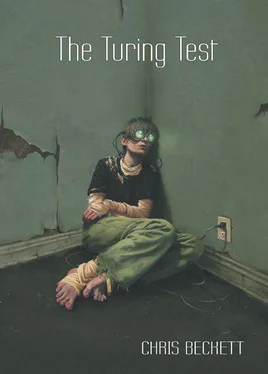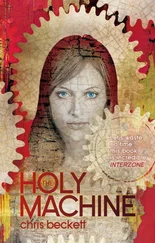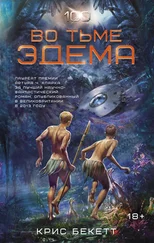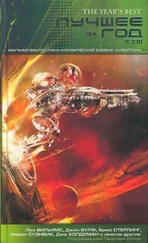You could ask this thing to be whatever kind of lover you wanted. But instead (God knows why) I blurted out: “I don’t want any of those. Just be yourself.”
The friendly smile vanished at once from the syntetica’s face. It sagged. Its mouth half-opened. Its eyes became hollow. I have never seen such terrifying emptiness and desolation.
Freddie told me later that I read too much into that expression. It was no different from the blank TV screen you get when you push a spare button on the channel selector… Well, perhaps. But at the time I was so appalled that I actually cried out. And then I fled. I literally ran from the room, and would have run straight outside into the street if the bouncer at the door hadn’t stopped me: “ Excusi, Signor. Il conto!”
There was a bill to pay and I had to wait to pay it because the receptionist was settling up with another customer who was paying extra for damage to the equipment. (“A hundred Euros, signor, for a cut lip, and fifty each for the black eyes… Thank you, Signor – oh, thank you very much, you are most kind – we look forward to seeing you again as usual…”)
As the other customer turned to go I saw the Roman nose and realised it was Sergeant Savonari of the Carabinieri, the very same who lined up with the Pope on the Robot Question.
* * *
I didn’t wait for Freddie. Male human company seemed about the last thing in the world I needed just then – and I guessed he would feel the same. So I spent a couple of hours wandering the streets by myself, in between those different cities that occupy the same space but hardly touch each other at all: the city of the Florentines, the city of the Euro-techs, the city of the tourists, the city of the displaced…
And it suddenly struck me that there was another city too which I hadn’t noticed before, though it had been there all the time:
Outside a tourist pizza place on the Piazza del Duomo, a little street cleaner trundles along on rubber tyres, peering about for litter and scooping up the discarded cardboard and polystyrene with long spindly arms…
Through the steamy window of a tiny bohemian restaurant, a waiter made of plastic and silicon quietly clears tables and serves coffee, while its bearded owner dispenses cigarettes and largesse to his customers…
Following behind a pair of carabinieri on the Ponte Vecchio, a robot minder guards the officers’ backs while they keep an eye on the beggars and pickpockets…
At the door of a Renaissance Palazzo, a sintetica housemaid in a blue uniform presses the entryphone button, a prestige domestic appliance clothed in human flesh, returning from an errand for its aristocratic masters…
The City of Machines.
I thought about the robot from the Accademia. I wondered whether it had been caught. I found myself having the irrational thought that I’d like to see it again.
* * *
Two days from the end of the holiday, I was sitting by the fountain on the Piazza della Signoria, eating a strawberry ice cream and wondering where to have my lunch when a taxi, driving too fast in what is basically a pedestrian precinct, snagged one of the little municipal cleaning machines with the corner of its bumper. The thing keeled over and lay there unable to right itself, its wheels spinning and its arms and eye-stalks waving ineffectively in the air.
I laughed, as did several other on-lookers. No one felt obliged to do anything. But a robot security guard and a sintetica servant, coming from different directions, lifted the thing gently back onto its wheels. They dusted it down and the sintetica squatted briefly beside it as if asking it whether it was okay. Everyone laughed: tourists, Florentines, African hustlers. The cleaner trundled away and the other two macchine headed off on their different errands.
I was suddenly seized by a crazy conviction.
“Hey you!” I shouted, dropping my ice cream and chasing after the security guard. “I know you, don’t I? I met you in the Accademia!”
People stared at me and exchanged incredulous glances, half-shocked, half-delighted at the outlandishness of the spectacle.
And there was more in store for them. It was the robot from the Accademia. It stopped. It turned to face me. It spoke.
“Yes… The Captives…”
It was so obviously a machine voice – flat and creaking – that it was hard to believe that I could ever have taken it for a human. Maybe as the programmed order of its brain gradually unravelled, its control over its voice was weakening? But strangely the very creakiness of it seemed touching, like something struggling against all odds to break through.
Hardly believing what I was doing, I touched its cold plastic hand.
“That afternoon in the Accademia – what was it you thought I understood?”
But before the automaton could answer me, it was interrupted by a shout.
“Alt! Polizia!”
A fat policeman was running up, followed by his hammerheaded minder. The Incontrollabile turned and ran.
“Shoot it!” the policeman ordered.
“No don’t shoot!” I pleaded. “It’s harmless! It’s just come alive!”
But the minder did not take orders from me. It lifted its hand – which must have contained some sort of EMP weapon – and the Incontrollabile fell writhing to the ground.
The policeman ran over. His thick moustache twitched as he looked down at the broken machine. Then he lifted his booted heel and brought it down hard on the robot’s plastic head.
A loud, totally inhuman roar of white noise blasted momentarily from the voice-box and the head shattered, spilling a mass of tiny components out onto the square.
The policeman looked up at me triumphantly.
“Don’t talk to me about these things being alive. Look! It’s a machine. It’s just bits of plastic and wire.”
* * *
I dreamed that the broken machine was taken to the monastery at Vallombrosa, where the simple monks mended it and gave it sanctuary. Somehow I found it there.
“I have come to see the macchina,” I told an old friar who was working among the bee-hives.
There was a smell of honey and smoke and flowers, and the old man’s hands and shining pate were crawling with fat black bees. He smiled and led me through a wrought iron gate into an inner garden.
The macchina was sitting quietly in the shade of a flowering cherry tree, almost hidden by its thick pink clouds of blossom, which were alive with the buzzing of foraging bees. Quivering lozenges of shade and pinkish light dappled its translucent skin. An old dog lay snoozing on its left side, a tortoiseshell cat on its right.
And it spoke to me about the Great Chain of Being.
“The first level is simple matter. The second is vegetative life. The third is animal life which can act and move. Then somehow the fourth level emerges, the level of self-awareness, which distinguishes human beings from animals. And then comes a fifth level.”
“Which is what?”
The macchina seemed to smile.
“Ah, that is hard to say in human words…”
* * *
“Gotcha!”
Bees and cherry blossom vanished.
Freddie had leapt out of bed onto the little domestic robot, trapping it beneath a duvet.
“Thought you’d pinch my ciggies again did you, you little bugger?”
He beamed up at me from the floor, expecting me to laugh.
But suddenly I had seized him by the throat and was ramming him up against the wall.
“ Leave it alone, you bastard , alright? Just leave the poor bloody thing alone!”
The first thing Karel Slade noticed when he woke up was an odd smell in his hotel room. It was like the plasticky smell of a new car which has just had the polythene taken off its seats, but with a hint too of something antiseptic, a hint of hospital. And it was entangled in his mind with the mood of a fading dream in which he was drowning or suffocating, or being held down.
Читать дальше











